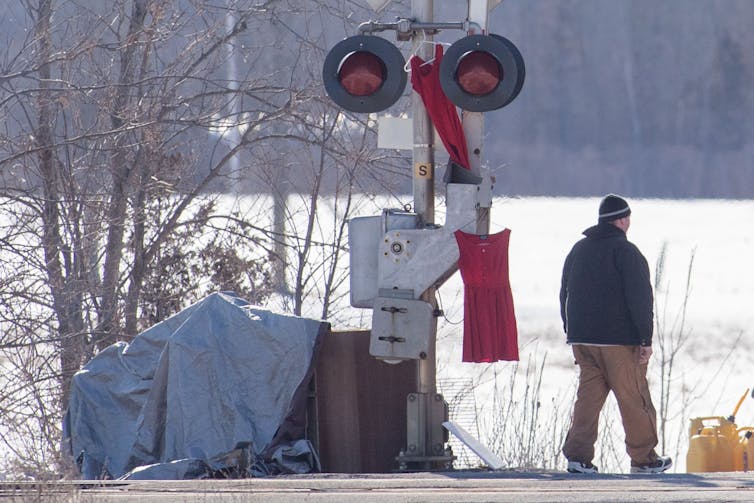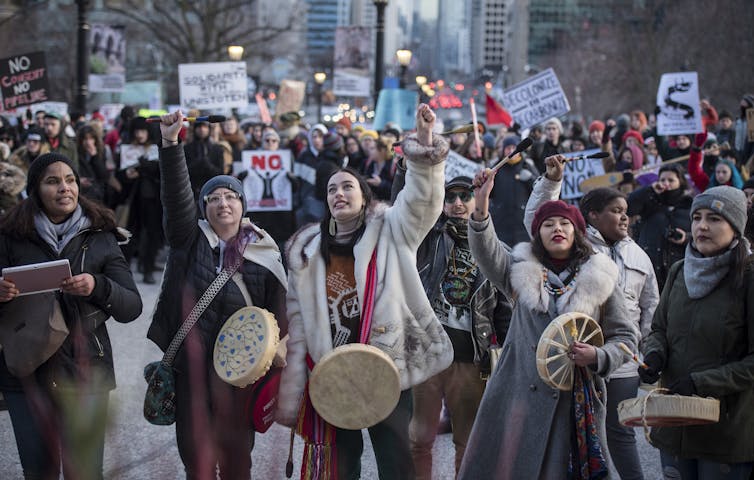Above Photo: Supporters of the Wet’suwet’en block a CN Rail line just west of Edmonton on Feb. 19, 2020. THE CANADIAN PRESS/Jason Franson
The recent RCMP incursion into Wet’suwet’en territory was aimed at enforcing an injunction. Coastal GasLink was awarded the injunction against Wet’suwet’en land defenders who were blocking construction of its pipeline.
Injunctions have long been an important part of “business as usual” for corporations that operate on Indigenous lands. But are they still a useful tool for protecting corporate assets?
Injunctions were also issued against blockades in Tyendinaga Mohawk Territory near Belleville, Ont., and at ports in Vancouver and Delta, B.C., held in solidarity with the Wet’suwet’en. The port injunctions were ignored for hours, leading to arrests.
Despite the injunction against the Tyendinaga Mohawk, the blockade remains in place. Mohawk lawyer Stephen John Ford says the blockade is not in violation of the injunction.

The refusal to comply with court injunctions, and the use of legal expertise to fight them, pose major challenges for Canadian businesses.
Several other blockades have not been served with injunctions and the government of Canada has said it will not use force to remove occupiers. This suggests that governments and corporations understand that the landscape of Indigenous resistance has shifted.
The asymmetry of injunctions
The Yellowhead Institute documented the use of injunctions by corporations as a tool to “deny recognition of Indigenous peoples’ inherent rights.” According to Yellowhead’s research, corporations are awarded injunctions against First Nations in 76 per cent of cases. Conversely, First Nations are awarded injunctions against corporations in only 19 per cent of cases.
One of the tests for an injunction is the relative impact on the two parties. In other words, who will suffer the greater harm?
Corporations point to the financial costs associated with blockades. In the original injunction awarded to Coastal GasLink, the judge cited a claim by the company that the blockade could cause hundreds of million of dollars in losses.
The financial considerations cannot be applied equally.

Resource extraction and transportation projects often threaten or harm Indigenous economies. But these communities are not measuring value just in terms of dollars and cents.
The British Columbia Supreme Court sided with Coastal GasLink based on claimed financial losses. The judge ruled that the future well-being of Wet’suwet’en lands and waters, which sustain traditional economic activities, was worth less.
But what is the price tag on a people’s sovereign right to continue their way of life?
Holding Canada accountable
The solidarity blockades in Tyendinaga and across Canada are intended to speak the financial language meaningful to corporations and governments. They are succeeding.
Sean Finn, chief legal officer of Canadian National Railway, acknowledged the tactic’s effectiveness when speaking about a solidarity blockade near Smithers, B.C. He said the blockade will have “a major impact on the economy going forward” because consumer goods and commodities are unable to make it to market.
Spokespeople from business organizations representing mining, lumber, grain and more have affirmed the impact.
Figures tallying the cost of the current blockades push into the billions.
But the cost to corporations in Canada involves more than just lost revenue. It also means greater uncertainty.
Uncertainty in the code of capital
The bedrock of a corporation’s value is not its economic attributes. It is the relevant legal code. Katharina Pistor, a law professor at Columbia University, calls this the “code of capital.” Legal uncertainty reduces the value of a corporation’s assets.
In 1997, the Supreme Court of Canada recognized the continued existence of Aboriginal title. This created uncertainty for corporations.
In the present matter, legal uncertainty is compounded by the Wet’suwet’en defence of their rights and title.
The blockades across Canada have spread the uncertainty. Corporate assets lose value everywhere that Indigenous peoples contest Canada’s claim to jurisdiction.
Documents obtained by Ryerson University criminology professor Shiri Pasternak and journalist Martin Lukacs show that Canadian corporate leaders wanted “certainty through surrender” of Aboriginal title. This would increase the value of corporate assets that depend on access to land and resources.


